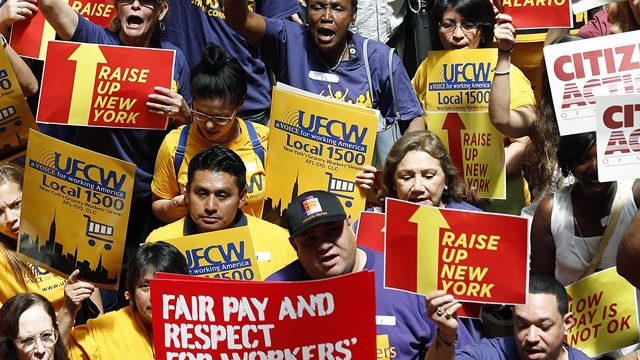Boosting minimum wage doesn’t mean more jobs, economists say

NOT EVEN CLOSE: Economists say raising minimum wages doesn’t result in job growth.
By Bre Payton | Watchdog.org
Raising the minimum wages doesn’t necessarily equate to job growth, some economists say.
Interestingly, though, Los Angeles activists partly relied on a conflicting theory in basing their plan to raise the minimum wage in that city.
The U.S. Department of Labor released job growth data last week, and reports quickly circulated, saying 13 states that recently increased the minimum wage saw faster job growth.
The Center for Economic and Policy Research has been tracking the job growth data in these states for several months and is using it as proof that the recent wage hike in Washington D.C. will boost the local economy.
Data from CEPR stating minimum wage boosts help local economies was cited throughout the language of a proposal to raise the minimum wage in L.A. to $15 an hour.
Not even close, other economists say.
Because workers earning minimum wage represent such a small portion of the workforce, a rise or decrease of jobs in that sector wouldn’t significantly affect overall job growth numbers, said Michael Saltsman, research director for the Employment Policies Institute.
In fact, only 4.3 percent of those in the workforce earn at or below the federal minimum wage. That number falls to 2.7 percent in regard to employed adults older than 25, according to the U.S. Bureau of Labor Statistics.
“Even a major drop in employment among this narrow group wouldn’t register in a labor force of 146 million,” Saltsman said
“Basic economics says if you raise the cost of something, demand will fall. It’s hard to imagine some people won’t suffer from companies looking for substitutes for their work by trimming back hours and replacing them with technology,” said Keith Hall, senior research fellow with the Mercatus Center.”That won’t show up in these broad growth numbers.”
Instead of looking at the overall job market, a better indicator of the minimum wage effect is job growth rates among those immediately affected by minimum wage increases, such as teenagers, Hall and Saltsman said.
A 2010 study by economists from Miami and Trinity University, sponsored by EPI, studied the impact wage hikes have on youth employment. The study focused specifically on how the 2009 federal wage increase from $5.15 to $7.25 affected jobs for teens.
In states where the federal minimum wage increased wages, jobs for teens dropped by as much as 10 percent. By contrast, there was no difference in states where the minimum wage was already above $7.25, the report stated.







